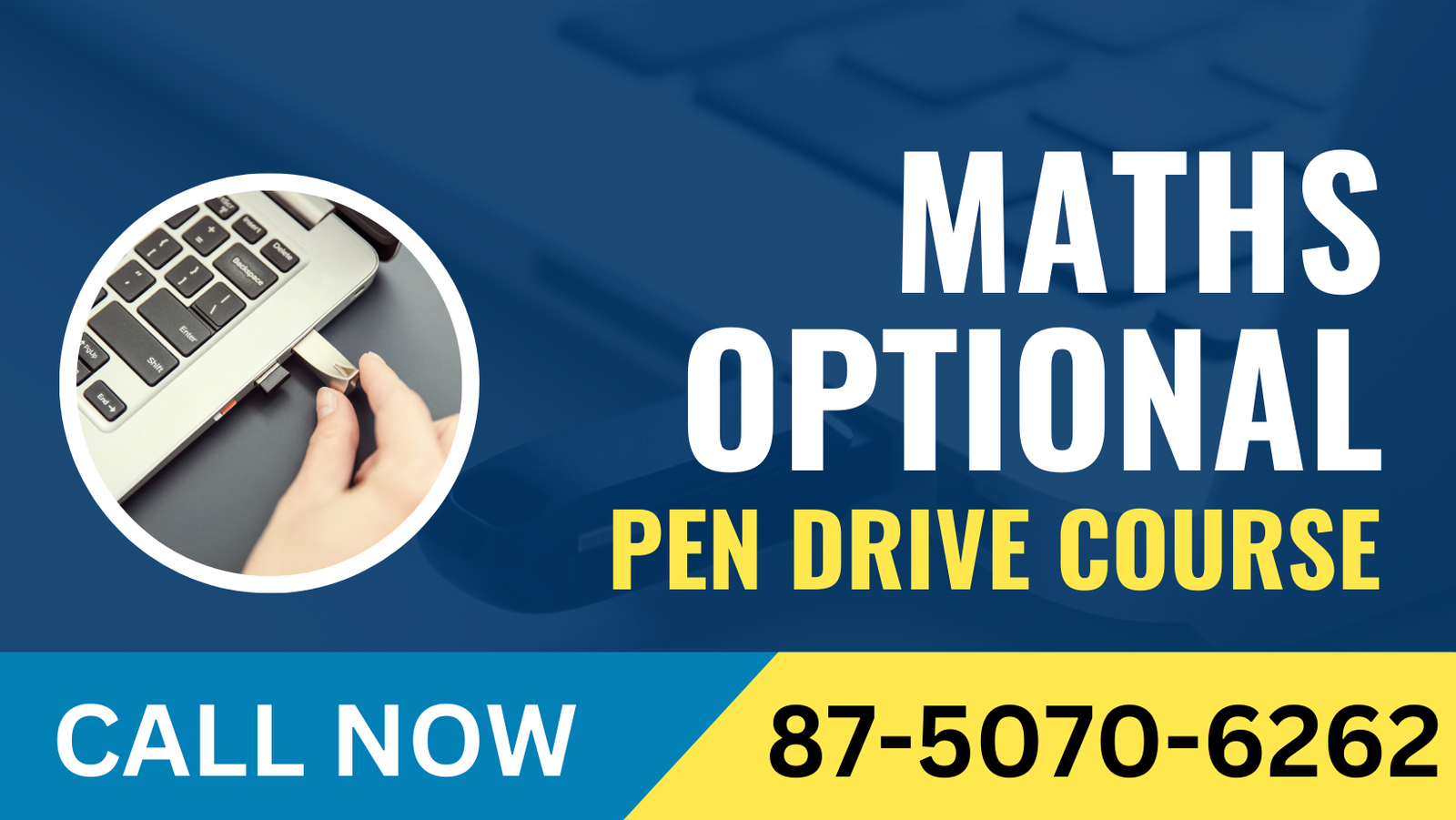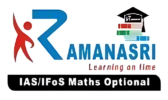
Pen Drive Maths Optional Course
The UPSC maths optional lectures are a great option for students who want to improve their analytical skills and problem-solving abilities. The course consists of a balance between theorems and applications, and toppers have attributed their high scores to this subject.
Preparing for this subject requires thorough revision and a strong love for mathematics. It is also important to write tests in a fixed time frame, as this will help you learn how to solve questions more quickly.
Pen drive Maths Optional Course Video lectures
If you’re planning on taking the UPSC Mathematics optional exam, it’s important to have the right resources. So, you can choose our Pen drive Maths Optional Course. There are several online and offline options to help you study for the exam. Many of these resources include video lectures, which are a great option for those with limited study time. They are easy to understand and can save you the cost of purchasing expensive textbooks. These videos are also a good choice for those who want to learn the subject from a certified expert.
The subject of Maths is a complex and difficult one, but it can be made easier by preparing properly. You can use video lectures to understand the concepts and principles involved in the subject, and they can also help you solve real-world problems. These lectures will also teach you how to read and write effectively. In addition, they can help you develop logical flow in your answers.
In order to prepare for the UPSC Maths optional exam, you should follow a consistent study schedule by using our Pen drive Maths Optional Course. You should watch video lectures and practice with previous year’s exam papers. You should also take notes and solve mock tests to identify the areas you are having trouble with. Then, you can focus on the problem areas and improve your score.
Mathematics is one of the highest scoring subjects in UPSC exams, but it can be difficult to pass if you aren’t willing to dedicate time and effort. It requires a strong understanding of concept building and extensive revision. Moreover, it’s important to have a passion for the subject. A passion for the subject will help you to make better decisions and become more confident in your answers.
The syllabus of the UPSC Mathematics optional exam consists of two papers, and each paper carries 250 marks. If you’re able to get a high score on these papers, you’ll be able to improve your overall rank. The subject is ideal for students who are interested in enhancing their analytical and problem-solving skills. It’s a great option for engineers and those with a science background. However, if you don’t have a passion for math, you should consider another optional subject.
Pen drive Maths Optional Course Mock tests
Choosing maths as your optional subject is an excellent way to increase your chances of passing the civil services exam. The syllabus includes subjects like Analytical Geometry, Linear Algebra with matrices, Calculus, Ordinary and Partial Differential Equations, Complex Analysis and Vector Analysis. It also covers topics such as mechanics, dynamics, statics, fluid dynamics and computer programming calculus.
The subject has two papers and carries 250 marks each. The best way to prepare for the subject is by reading and revising it regularly. You can also practice questions and take mock tests to test your knowledge. It is important to understand the theories and concepts that are behind the problems. This will help you solve them quickly and accurately. You can find free resources online that offer a wide range of questions and explanations. It is advisable to study previous years’ exam papers to get a feel for the type of questions that will be asked in the exam.
In addition, you should allocate a fixed amount of time for revision. This will help you avoid cramming your material and will allow you to focus on answering the questions in a logical flow. It is also important to practice multiple-choice questions, as they are a large part of the exam. Moreover, you should make notes on the concepts that are difficult for you to grasp. These notes can be useful when you are writing answers in the exam. It is also a good idea to read the answer scripts of toppers. This will give you a better understanding of how to structure your answers.
The toppers of UPSC exams have attributed their high scores to their strong preparation in mathematics. Despite its difficulty, the subject is a great choice for those who want to get a high rank in the Civil Services exam. The subject does not require a lot of current affairs, which is beneficial for those who have to prepare for other subjects as well. In addition, the subject requires a lot of problem-solving skills and is an essential element of IAS exams.
Pen drive Maths Optional Course Syllabus
Maths is a subject that requires a lot of practice and a deep understanding of the concepts. It is an excellent option for aspirants who want to improve their analytical skills and problem-solving capabilities. It also has one of the highest scoring potentials among the optional subjects. It is important to study the syllabus thoroughly and keep revising it regularly. It is also a good idea to practice mock tests and full-length exam papers to get a feel for the questions. Also, avoid memorizing formulas and instead focus on building a logical flow in your answers.
The UPSC mathematics optional course offers a comprehensive set of topics that will prepare you for the examinations. It will cover topics like Analytical Geometry, Linear Algebra with Matrices, Calculus, Ordinary and Partial Differential Equations, Complex Analysis and Vector Analysis. This course will also help you sharpen your analytical and problem-solving skills, which will be useful in your other subjects.
While it may seem daunting to take the maths optional exam, it is possible to do well if you put in the work. You will need to devote a large amount of time and effort, but the rewards are worth it. The most important thing to remember is that maths questions are not subjective, and you can score highly by tackling them in a systematic manner.
If you are a science graduate, you can do well in the mathematics optional exam by studying your core subjects, and concentrating on the areas where you are weak. In this way, you will be able to maximize your scores and have a better chance of making it into the civil services. This will also help you get a better job in the future.
It is important to practice the problems that you are weak in, as this will help you increase your speed and accuracy. It is also helpful to read the previous years’ question papers, as they can give you an idea of how difficult the questions will be. It is also a good idea to take a test series program, as this will help you to understand the questions better and provide you with the best preparation materials.
Pen drive Maths Optional Course Tips to pass the exam
While choosing a subject for UPSC, it is important to select a subject which you can easily grasp and understand. Mathematics is one of those subjects which are easy to learn and comprehend. In fact, it is a very scoring subject in terms of marks. It is also a very good optional subject, as it shields candidates from the monotonous nature of General Studies. It also presents a good opportunity for those who want to get into the civil services.
The best way to prepare for the exam is by solving PYQs and tests based on the UPSC pattern. These will help you to tune your mind to complete the paper in a time-bound manner. It is also important to practice writing the answers in a neat and clean manner. This is because the answer sheet will be evaluated by the examiners on the basis of accuracy and presentation. In the case of maths, it is important to systematically write the solution and not make any calculation mistakes. This will ensure that you do not lose marks on account of a small mistake.
You can also take up the previous year papers and check the patterns of questions asked. This will help you in preparing your notes and understanding the structure of the question paper. Moreover, it will give you an idea of the time which should be spent on each unit. For example, you should spend maximum 2 weeks on Linear Algebra and 1 week on Numerical Analysis problems. Besides, you should prepare your own Note book for quick revision and keep a separate formula sheet. Ensure that you write the questions, their solutions and the substitutions used in each problem. This will save you a lot of time in the long run.
While choosing a pen drive course, make sure to go for the one which offers best video lectures and quality test series. Plutus IAS pendrive courses are available at affordable prices and provide aspirants with high-quality guidance and material to pass the examination. These include video lectures, detailed study materials, UPSC pdf notes and test series. The lectures are presented by experienced teachers and help you to clear the exam in your first attempt.
